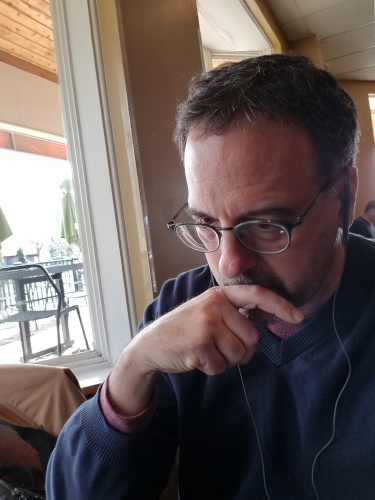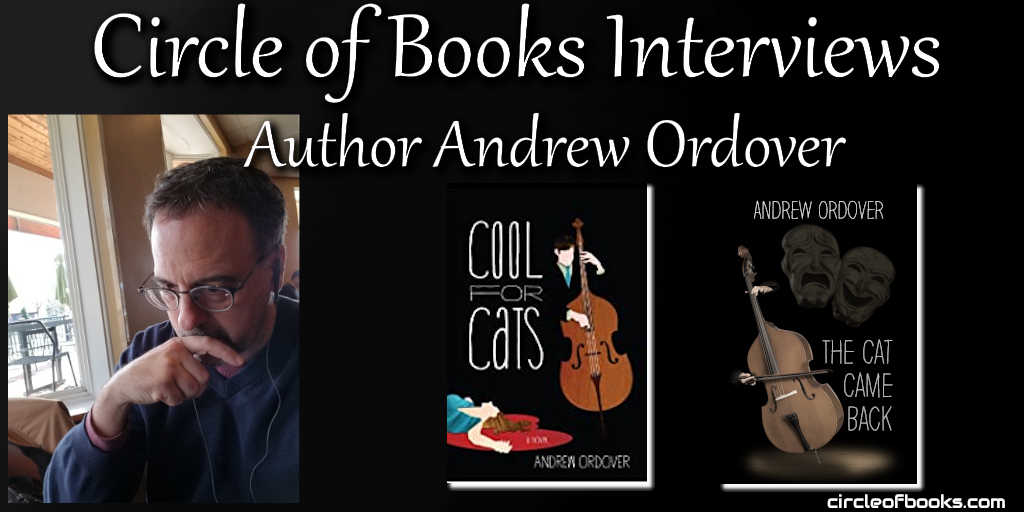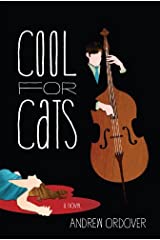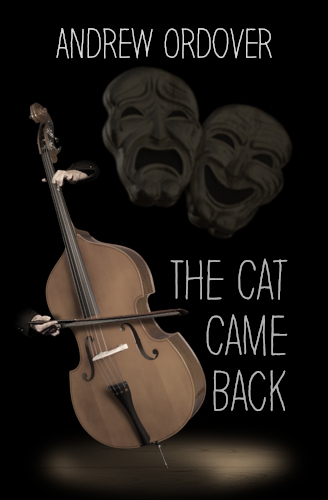Interview Andrew Ordover

Interview
– When did you start writing novels, what moved you to start writing?
I started writing novels about ten years ago. I’ve been a writer all my life. I wrote stories and poems when I was a kid. In my 20s and 30s, I worked as a playwright, mostly in Atlanta and New York City. When members of my theater company started going their separate ways, and I went off to start a family, I turned back to prose, so that my writing would not have to depend upon a stage, a director, or a group of actors to bring a story to an audience.
– In what genres do you write? Do you plan writing in other genres?
It’s interesting. As a playwright, I loved exploring politics, religion, retelling of classical tales and myths. I tried to be innovative, experimental, and different. As a novelist, none of that is very interesting to me now. I enjoy working within the established tropes of mystery writing, but most of all, I enjoy the group of characters and the world I’ve created for them. I’m not sure where my writing will lead me when I decide I’m finished playing with them.
– Tell us about your novels. Why should everyone buy them?
I don’t think of my novels as classic whodunits, as much as character-driven novels that happen to center around a mystery. For me, the sense of place and people is paramount—I want readers to feel at home in and comfortable with my version of Atlanta and with my little gang of musicians and their hangers-on. I want readers to feel like these are not only real people, but fun, warm people they’d like to hang out with, themselves, and spend more time with. I want my corner of Atlanta to feel to readers like Louise Penny’s Three Pines in Quebec.
– What is your all time favorite novel/book? What makes it special?
The books I love most are the ones where language and storytelling are strange and surprising and beautiful in some way—not flowery, necessarily, but with some poetic force and immediacy that makes me see life, or language, differently. Some of those books include:
The Great Gatsby, by F. Scott Fitzgerald
Holy the Firm, by Annie Dillard
Waiting for Godot, by Samuel Beckett
Collected Poems, by ee cummings
– Tell us a bit about your writing process.
Actual writing goes pretty quickly for me when I finally sit down to do it. I tend to spend a long time ruminating and imagining, once I get a basic outline down. I kind of throw things onto the back burner of my brain and let the simmer for a while, until they feel cooked.
– What author would you love to have dinner with?
I can’t settle on just ONE! Here’s the party I’d want to throw:
F. Scott Fitzgerald
Hunter S. Thompson
Kurt Vonnegut
Annie Dillard
Samuel Beckett
James Thurber
N.K. Jemisin
Louise Penny
– Tell us about your hobbies and passions other than writing.
Writing is my major hobby, But I also enjoy reading, listening to music, watching old movies, running, hiking, and taking a ridiculously long, slow time to learn how to play the banjo.
– We have many followers who would like to start writing a book or are already writing their first novel, any advice for these brave people?
- Don’t write what you know, or think you know. Write what you want to learn or discover.
- Cover your seeds and let them grow (i.e., don’t show your work in progress to everyone).
- It’s okay to walk away for a bit, and come back with fresh eyes.
- As hard as the first draft is, it’s actually the easy part, compared with revising.
- Don’t be afraid to treat your characters like crap. Readers are terrible people; we enjoy watching characters struggle.
- Don’t give up.
– How often do you write, daily, every other day or?
I wish I had a more actual writing schedule! With my day job in education, and two teenagers, and…a bad habit of looking at Facebook instead of my draft…I write when I force myself to. Like exercise, if I get myself into a rhythm, I find it easy to keep the rhythm going; if I fall off, I find it hard to get back into the swing of things.
– Do you keep a notebook with ideas for your novels? If so do you carry the notebook with you so you won’t forget any ideas?
When I was writing plays, I kept a notebook—one per project. I wrote research notes and scraps of dialogue in it, but I also wrote notes on the fly, on scraps of paper or cocktail napkins, that I taped or glued in when I got back home, along with line drawings or pictures that spoke to me in some way.
These days, I do the same thing, but on the computer. I keep a file in Dropbox of my outline, my notes, scraps of descriptions or dialogue, pictures I’ve copied from various websites, URLs or text from articles I need for research, etc. Since all of my writing is on the computer, and I never know where I might be, I find it much easier to keep it all in the cloud.
– How important is it to have your facts right and are there any instances when you bend history to fit your story?
I think it’s important to know the facts, so that you can decide where and how to bend or ignore them. I don’t mind bending or ignoring; I just prefer to know that I’m doing it! For my mysteries, I try to get the law right, as best I can (not being either a lawyer or a policeman). I try to make sure I know the terrain of the places I’m setting scenes, and if I feel like I need more freedom to move things around, I will occasionally fictionalize a place so that it can be based on something, instead of having to be that something.
– What are you reading at the moment?
The Mirror and the Light, by Hilary Mantel (third book in the Thomas Cromwell trilogy)
How the Other Half Learns, by Robert Pondisco (a look at a NYC charter school network)
Ecstasy and Terror, by Daniel Mendelsohn (essays on the Ancient Greeks)
Recently finished: The Broken Earth trilogy, by N.K. Jemisin
– How is it to be an author in your country? Do you have a good support from the local public?
I could have answered this better in my playwriting days, when I was more clearly identified as an author by my (very small) local community and audience. My primary identification within my community is not as an author, so it’s hard to say what it’s like to live that life.
– Certainly you have had some interesting episodes as an author, fans related or others, share one of them with us.
I was invited by my father and my wife to attend two different book clubs as a guest author, and answer questions about my first book, Cool for Cats. Two very different groups of people, who know me in two very different contexts, living on two different coasts. It was great fun to chat with and listen to people who really engaged with and enjoyed my writing.
– A final message for our circleofbooks.com readers.
I hope you’ll give my books a try! I think you’ll find them lively, funny, fast-paced, occasionally dark, occasional thoughtful or philosophical, and unpredictable enough to keep you guessing.
Thank you Andrew Ordover. We at circleofbooks.com wish you much success!
Click here to visit the author page here on Circle of Books.
Tweet


